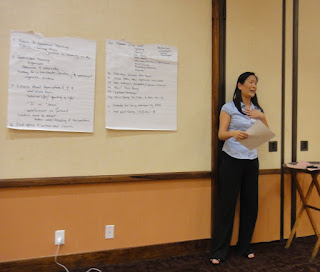Thursday, May 10, 2012
HIWAII PROSECUTORS AIM FOR SUSTAINABLE TRAINING
On the Road in Kona
Monday of last week I was in Hong Kong and watched a Barrister cross-examine the defendant in a high profile murder case – more about that experience here. Then, after a one-day turnaround in Seattle, travelled to Kona, Hawaii. Last Friday I conducted a day-long seminar on “Sustainable Prosecutor Training” for Hawaii’s prosecutors in the King Kamehameha hotel ballroom on the Kona side of Hawaii.
Charlene Iboshi, Prosecutor for the Big Island, spearheaded the creation of the seminar that would examine the needs for training (not only in trial advocacy but on all other aspects of the prosecutor’s roles and functions) and how to establish ongoing training. Charlene is pictured here having dinner with Nancy and me following the seminar. Unfortunately, Charlene Iboshi who is a strong advocate for prosecutor training will be retiring at the end of the year from being the elected prosecutor.
After my opening presentation on training methodologies, the morning session was devoted to brainstorming to determine the needs for and obstacles to prosecutor continuing education. This was accomplished through break out workshops followed by reports back from the groups to the whole. The workshop groups were divided by prosecutor’s office because the office size varies. The Honolulu office has over a hundred prosecutors and the others are substantially smaller. The size differential leads to different training needs and obstacles.
Besides the usual time and money barriers, the state of Hawaii has some unusual hurdles. One hurdle is that Hawaii is the only state where the position of Prosecutor Coordinator is vacant. A state’s Prosecutor Coordinator normally designs and orchestrates training for the state’s prosecutors. The National Association of Prosecutor Coordinators is an organization that enables Prosecutor Coordinators to exchange ideas about matters such as prosecutor training.
The afternoon session was devoted to determining how to overcome barriers to sustainable training, design meaningful training and ensure that it will be carried on. Again the approach was to breakout into same workshop groups with reports back to the whole. The groups discussed the following issues:
1. How can the obstacles to the establishment of a sustainable prosecutor career development training program (identified in the morning discussions) be overcome?
2. How can you energize lawyers and nonlawyers to plan for and implement solutions to those problems?
3. For each identified need:
a. What organization (prosecutor’s office, state or national) should provide the prosecutor training?
b. Who within the organization can manage and maintain the training program?
4. In-House Training: Given the busy nature of a prosecutor’s office, discuss these issues:
a. What topics should be taught?
b. When is there time available to conduct training?
c. Who can teach the subjects?
d. What course materials are available or can be created?
e. Who should be responsible for creating the materials?
f. Where should the training materials be stored, such as a central website for the office?
g. How do you create and maintain long-distance learning, such as having training broadcast to each prosecutor’s office?
5. Statewide Training: Turning now to training provided by the state, discuss the issues identified in number 5 above, such as who manages the training.
6. With the demise of the National Advocacy Center for state and local prosecutors, inexpensive nationwide prosecutor training for a large numbers of prosecutors has disappeared. Nevertheless, national courses are still being offered. How can Hawaiian prosecutors take full advantage of such courses?
Pictured here is one of the attendees reporting back to the group as a whole on the issues discussed in the workshop.
The seminar proved productive. For instance, one of the goals recommended by the groups is filling the vacant Prosecutor Coordinator position. In the near future, a report detailing the findings and recommendations of the workshop groups will be issued.
Subscribe to:
Post Comments (Atom)




No comments:
Post a Comment